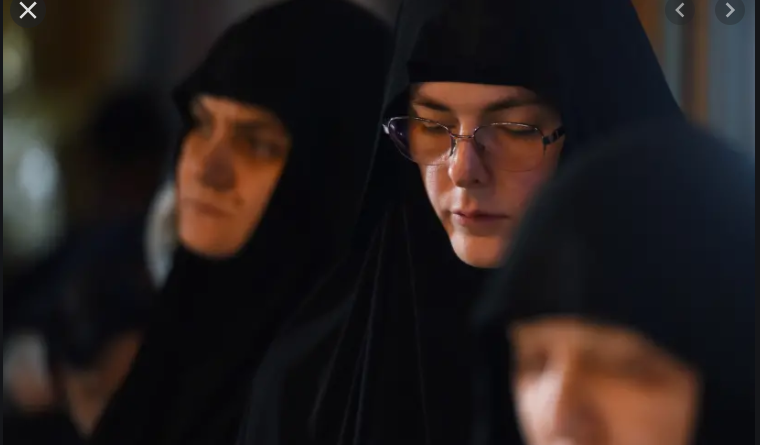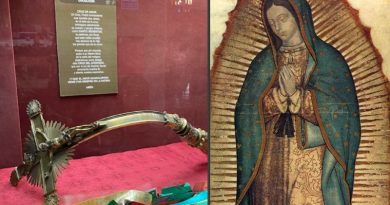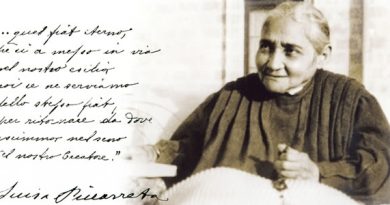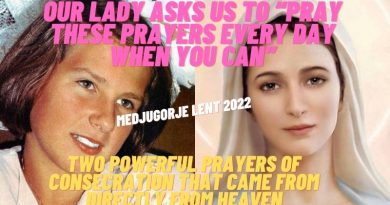“Extinguishing opposition” – Nuns arrested as Beijing turns up heat on Church in Hong Kong
(For more Reuters Special Reports, click on)
By Greg Torode
HONG KONG, Dec 30 (Reuters) – In a high-walled Art Deco villa in the Hong Kong suburbs of Kowloon, the Vatican operates an unofficial diplomatic mission, its only political outpost of any kind in China.
The mission keeps such a low profile that it isn’t listed in the Roman Catholic Church’s formal directory of every priest and property in the city. The two monsignors who staff the outpost have no formal standing with Beijing or the Hong Kong government, and they don’t conduct official work, not even meeting Hong Kong officials. The tenuous foothold is a sign of the delicate position in China of the world’s largest Christian denomination, many of whose members in Hong Kong staunchly support the city’s democracy movement.
And now the mission – and the Church as a whole in Hong Kong – is coming under mounting pressure as Beijing moves to extinguish opposition voices in the city under a new national security law.
In May, two Chinese nuns who work at the mission were arrested by mainland authorities during a visit home to Hebei province, according to three Catholic clerics with knowledge of the matter. The nuns, in their 40s, were detained for three weeks before being released into house arrest without being charged. They are forbidden to leave the mainland, according to one of the clerics. Meanwhile, Western diplomats say, Chinese security agents have stepped up surveillance of the mission in recent months.
The arrests, which haven’t been previously reported, are viewed by top clerics here and in the Vatican as a sign Beijing wants the mission shut. It lacks official standing because the Holy See and China haven’t established formal diplomatic ties. While priests are sometimes arrested on the mainland, “it is highly unusual for nuns to be detained,” said another of the clerics, who has long-time contacts on the mainland. “Normally they are left alone.”
The pressure is also being felt at the heart of the Church in Hong Kong, by the leadership of the large local diocese.
Senior members of the clergy in Hong Kong told Reuters that Beijing is trying to extend its control over the diocese, in part by influencing the choice of the city’s next bishop, a position that’s been open since the last bishop’s death two years ago. Beijing, they said, is seeking to apply to Hong Kong a two-year-old agreement with the Holy See that gives the Chinese government a significant say in the appointment of prelates on the mainland.
According to Vatican officials, Hong Kong wasn’t part of the deal because of the city’s semi-autonomous status. But with Beijing exerting greater control over Hong Kong, mainland priests have been passing information to priests in the city about which clerics the ruling Communist Party favors to take on the bishop’s role, the senior clerics said.
As the pressure rises, the acting head of the local Church, Cardinal John Tong, has been curbing activist voices in the Catholic hierarchy, according to four people with knowledge of the matter. One target has been the Justice and Peace Commission, a human rights body within the diocese that has traditionally championed political and religious liberty.
In October, the four people said, Tong’s executive committee, known as the curia, censored a statement on Sino-Vatican relations released by the commission. They removed a reference to James Su Zhimin, the Bishop of Baoding, who was arrested by Chinese authorities more than 20 years ago on the mainland and has become a hero to many in the Church. His fate is unknown.
Tong, 81, has also told his priests not to deliver sermons that are too political, cautioning them that they should avoid using language that causes “social disorder.” Tong, like all bishops, has full administrative authority over his diocese.
“We are at the bottom of the pit – there is no freedom of expression anymore,” the former Bishop of Hong Kong, Cardinal Joseph Zen, told Reuters in a written reply to questions. “All these things are normal in mainland China. We are becoming like any other city in China.”
With the exception of 88-year-old Cardinal Zen, all Church leaders, local priests and parishioners interviewed for this article declined to be named. “For any word you say,” Zen told Reuters, the authorities “can say you’re offending the National Security Law.”
In a written statement, the office of Hong Kong Chief Executive Carrie Lam said the rights and freedoms of Hong Kong residents, including freedom of religion, are safeguarded under both Hong Kong’s Basic Law, the city’s mini-constitution, and the national security law.
The Liaison Office, the main arm of the Chinese government in Hong Kong, didn’t respond to questions for this article. The Ministry of Foreign Affairs in Beijing didn’t answer questions about the nuns’ status. Asked whether China sought to shut down the unofficial Vatican mission in the city, the ministry said in a statement: “As far as we know, the Vatican has not set up any official representative institution in Hong Kong.”
A Vatican spokesman declined to comment for this story. In a statement, the Hong Kong diocese said that parishioners are encouraged to express their views. “Hence, instead of suppression, the Diocese welcomes a wide spectrum of different voices,” it said. Cardinal Tong declined an interview request.
ACTIVISTS ARRESTED
The pressure on the Catholic Church is building as Beijing advances a broader effort to stamp out independent political forces in Hong Kong. That push began early this year, after months of sometimes violent mass protests. It intensified on June 30, when China imposed the new national security law that makes anything Beijing regards as subversion, secession, terrorism or colluding with foreign forces punishable by up to life in prison.
Since then, leading pro-democracy activists have been arrested. Democratic lawmakers have been ousted from the legislature, and others have quit in protest. This month, one of Hong Kong’s most prominent democrats, media tycoon Jimmy Lai, was charged with colluding with foreign forces under the national security law. And teachers have had their licenses revoked for allegedly making political comments in class.
The Church is the latest major institution here to feel squeezed by Beijing. Reuters has documented this year how other institutions central to the city’s freedoms and rule of law, including its judiciary, its police force and the democracy movement itself, have been weakened, co-opted or cowed. For the ruling Communist Party, Hong Kong’s Catholics pose a serious challenge to its authority.
On the mainland, a government religious bureaucracy and decades of repression have contained religious practice and the sway of the Vatican, effectively driving big sections of the Catholic Church underground. But in Hong Kong, the Church has flourished.
The Catholic enclave grew in importance during the decades Britain ruled the city after the Communist Party took power in 1949 and dramatically curtailed religious freedom on the mainland. Hong Kong became a base for missionary outposts that reached into mainland China, attempting to keep contact with the faithful.
Today, there are an estimated 400,000 Catholics in this city of 7.5 million, and the Church permeates society through a network of schools, hospitals, charities and newspapers. Many of the city’s elite are products of Catholic schools opened early in the British colonial era. Particularly troubling for Beijing, Catholic activists have been influential in the city’s protests and pro-democracy movement.
With Beijing’s crackdown on Hong Kong intensifying, Tong and his diocese leadership are now moving to curb these activist voices, including that of the Justice and Peace Commission. The decision by the Church hierarchy to remove the reference to Bishop Su and other clerics detained on the mainland from the commission’s October statement is telling, according to three of the clerics who spoke to Reuters. For years, the commission had stood by Su, regularly issuing calls for his freedom.
The focus on the commission reflects its decades of support for democratic movements in the city, said multiple people familiar with its work. Formed in 1977 and funded by the diocese, the commission comprises lay Catholic volunteers and full-time staffers who are overseen by senior clergy. It has long monitored religious persecution on the mainland. And it is a member of a broad democratic action group called the Civil Human Rights Front that has organized some of Hong Kong’s larger regular protests, as well as some of last year’s mass peaceful protests.
“Although the commission faces more challenges under the National Security Law, we will continue to implement Catholic Social Teachings for the promotion of social justice in every aspect of human life,” Lina Chan, the body’s executive secretary, said in response to questions.
The commission’s work has included speaking out for religious figures, such as Bishop Su, who have been repressed on the mainland. In October 2017, for instance, it organized a prayer vigil to mark his detention that was attended by then-Bishop Michael Yeung.
Hong Kong Catholics say Su’s plight has long resonated in their community, given the harshness and length of his detention and his role as a spiritual leader in China’s Hebei province, traditionally an underground Catholic stronghold. Su’s fate has never been explained by Chinese authorities.
U.S. House Republican Chris Smith chastised China for Su’s treatment at a congressional human rights hearing this year. “Why does a powerful dictatorship fear peaceful men and women of faith and virtue?” said Smith, who met Su in 1994.
POLITICAL SERMONS
Since the national security law was imposed, said one person familiar with the commission’s operations, the diocese leadership has been particularly keen for the body “to adopt a more neutral posture.”





